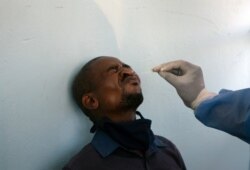The restrictions imposed during South Africa’s battle with COVID-19 have left lasting damage on untold numbers of South Africans -- including the nation’s already pinched middle class. According to a United Nations study, more than a third of the Rainbow Nation’s middle class households have been pushed into vulnerability. A young university-educated South African said his middle-class dreams have been shattered.
Like many South Africans, Tshegofatso Balerileng had a tough year as his nation imposed strict coronavirus measures -- at the cost of the already struggling economy. He was laid off in June and moved in with family.
“Things became difficult even at home. I couldn't I couldn't provide for my family the way that I used to, and at the time I lived with my grandfather and my father and none of them were employed. So we basically had to survive on the grants that they were receiving from the government,” said Balerileng.
Millions of South Africans are telling a similar story this year. The nation’s five-week hard lockdown kept countless workers from physically going to work. The government estimates that as many as 3 million people work in the informal economy.
But Balerileng is the rare South African with a college degree, an emblem of the dream of a robust Black middle class. A UN report estimates that as many as 34 percent of South Africa’s middle class households are now vulnerable.
The pandemic dealt a blow to an already contracting economy with record unemployment levels, says economist Dawie Roodt.
“Things were pretty bad even before the beginning of this year," said Roodt. "And then we had this virus and lockdown, and everything went from bad to really, really bad. I think the South African economy today, it's not even in a recession -- it's actually in a deep depression.”
President Cyril Ramaphosa acknowledged the damage the pandemic has wrought, and has urged patience. When he announced a hard lockdown earlier this year, he also announced a raft of economic stimulus measures, mostly aimed at poor households.
"History will absolve me because the determination to put things right is there," said Ramaphosa. "And we may be moving at a slow pace, and we may be moving at a pace where people want faster movement. But we are painstakingly putting things right."
But many South Africans say it isn’t enough. Balerileng couldn’t qualify for unemployment benefits, because he had not been unemployed for three months at the time of his application.
“I think, unfortunately, there's a certain perspective that even though you're part of the middle class, you would still be able to survive the pandemic even though you just lost your job,” said Balerileng. "Or there's always the assumption that there's still money put somewhere for you to survive, even if it's not for long enough. But there still is something for you to survive on until a certain time. And unfortunately, that's not really the case.”
Roodt says he is fundamentally more worried about the poor, who have felt the worst effects. And, he said, things won’t improve unless the government does something drastic -- that will, again, probably hurt the middle class -- and the 2 million civil servants who are part of it.
“There's only one thing that the minister of finance can do. There's really only one thing -- he must spend less money," said Roodt. "And inevitably, that means he must spend less money on people. That means he must start cutting, he must start closing down things. He must close down state-owned enterprises, fire a lot of civil servants and he must pay the rest less. That is what must happen and that is what is going to happen. Either we do it now while he’s still got some control or inflation is going to do that for you over time, eventually.”
Balerileng has landed on his feet, for now, with a job at a government hospital. But will things improve for him in 2021? He’s optimistic, but the numbers tell a different story.






